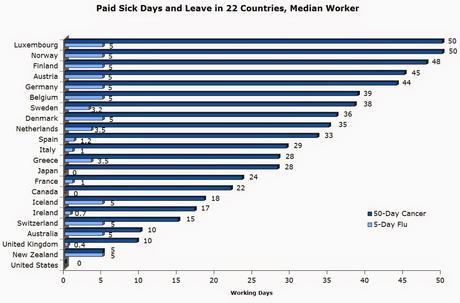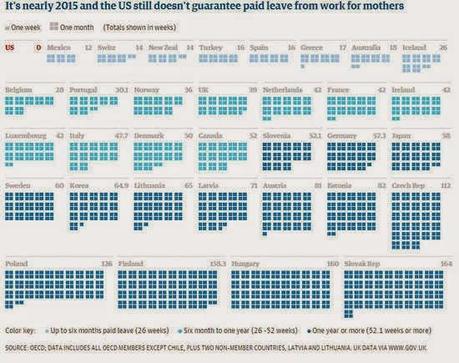

The charts above should shame all Americans. The top chart shows that the United States is the only developed country that doesn't provide at least some paid sick leave for a person going through a 50-day cancer treatment, and is one of only three countries that provides no paid sick leave for someone suffering a bout with the flu, or any other short illness. The bottom chart shows the United States is the only developed nation that provides no paid leave for mothers after having a child (with the U.S. providing only 12 weeks of unpaid leave).
Some companies do provide some paid sick leave, but as many as 40% of U.S. workers have no access to paid sick leave -- which means they must go to work when sick (putting other employees and/or customers in danger of contracting the illness) or when their child is sick, or take a cut in pay for missing work (something low-wage workers simply cannot afford).
President Obama knows this is wrong, and determined to make meaningful changes before he leaves office, is taking action. He is issuing an executive order that will give government employee mothers six weeks of paid leave after having a child. He is also calling on Congress to extend this benefit to mothers working in the private sector, and asking Congress to pass the Healthy Families Act -- which would guarantee all American workers seven days of paid sick leave. Here is how presidential advisor Valerie Jarrett puts it:
So on Thursday, President Obama will call on Congress to pass the Healthy Families Act, which would allow millions of working Americans to earn up to seven days a year of paid sick time — and call on states and cities to pass similar laws. The President will outline a new plan to help states create paid leave programs, and provide new funding through the Department of Labor for feasibility studies that will help other states and municipalities figure out the best way to implement programs of their own. And the President will sign a Presidential Memorandum that will ensure federal employees have access to at least 6 weeks of paid sick leave when a new child arrives and propose that Congress offer 6 weeks of paid administrative leave as well.
This is a brilliant move by the president. The Republican Congress must either provide paid sick leave for workers and paid leave for mothers (neither of which they want to do), or once again put themselves at odds with what the public wants (since a majority of Americans want these) -- giving the Democrats another issue on which to campaign in 2016. Failure to provide these benefits would show the public that Republican officials have a continuing disrespect for American workers.
Providing sick leave benefits would be good for everyone in this country -- workers, employers, and consumers. And it would put us in line with what other developed nations do for their workers. Here are some facts listed by the Center for American Progress on the importance of guaranteeing paid sick leave:
- 38 percent of private-sector workers lack even one paid sick day. This percentage is lower for full-time private-sector workers (25 percent), but it is significantly higher for part-time workers, with 73 percent lacking access. Full-time workers are more than three times as likely to have access to any form of paid leave than part-time workers.
- Low-income workers are less likely to have access to paid sick days. The average wage of workers without paid sick leave is $10 per hour. If a worker with this salary has a family of two children and misses more than three days of work without paid leave, the family would fall below the poverty line due to lost wages. What’s more, 90 percent of private-sector workers whose earnings are in the top 10 percent in their occupation get paid sick days compared to only 23 percent of workers in the bottom 25 percent. And workers with a college degree are more than twice as likely to have access to paid leave than those with less than a high school education.
- Women are less likely than men to have paid sick days. Female-dominated jobs, such as those in service industries, are less likely to offer paid sick leave. This discrepancy becomes crucial when considering that 80 percent of mothers assume responsibility for their children’s doctor visits, meaning they are more likely to need time off work for a child’s illness than male workers. Parents with access to paid sick days to care for a child are also nearly twice as likely to report being very satisfied with their work than those without access.
- Workers with access to paid sick days are more likely to utilize preventative health services such as cancer screenings and tests. Studies show they are also less likely to use costly hospital emergency rooms or delay treatment for themselves or a family member, even after controlling for access to health insurance. Universal paid sick leave would reduce emergency room visits by 1.3 million a year, saving $1.1 billion in medical costs annually. Finally, workers with access to paid sick days are nearly one-third less likely to be injured on the job, resulting in lower health care and employer costs.
- Many Americans risk their jobs to care for themselves and their families. Twenty-three percent of adults say they’ve been threatened with termination or fired for taking time off when they or a family member were sick.
- Latinos are the least likely to have access to paid leave of any type out of any racial or ethnic group. Only 43 percent of Hispanic workers have access to paid leave, compared to 59 percent of whites, 61 percent of African Americans, and 62 percent of Asians. Latinos are also the least likely group to have access to even unpaid leave—meaning that when they or a family member get sick, they truly have no options.
- Workers without paid sick leave are 1.5 times more likely to go to work sick and contagious than those who have paid sick days. For instance, 90 percent of employees in the food service industry do not have paid sick days. Seventy percent of women and 67 percent of men in the restaurant industry report cooking, preparing, or serving food while sick. Moreover, many of the workers least likely to have paid sick days are those who care for our families and loved ones in schools or elder care facilities.
- Employers have little to lose and much to gain from granting paid sick days. A study of Connecticut’s policy mandating five days of sick leave found that full use of this leave would cost an employer only 0.4 percent of their sales revenue on average. Without paid sick days, employees come to work unhealthy, costing employers $160 billion per year due to lower productivity levels.
- Workers who have paid sick days don’t abuse them. On average, workers who are covered take 3.9 days per year for illness and 1.3 days to care for sick family members, while workers without sick days take an average of 3 days per year.
- The United States is the only developed country that doesn’t guarantee paid sick leave. This hurts both our economy and U.S. workers. As wage growth has stagnated, benefits such as paid sick days have become all the more important to ensuring workers can stay out of poverty and in the middle class.
- Some states and municipalities are seeing the benefits of paid sick days.Across the country, campaigns are underway to make paid sick leave a reality for all Americans. San Francisco, the first locality to guarantee paid sick days, experienced few problems with its policy and its economy grew faster than those of surrounding cities once paid sick days were in place.
- Americans want a paid sick day policy. Three-quarters of adults support a policy giving employees a minimum number of paid sick days. Ninety percent of adults support a specific proposal allowing up to seven paid sick days per year.
- The Healthy Families Act would provide workers with the right to up to seven job-protected paid sick days per year to recover from their own short-term illnesses or to care for an ill family member. Sen. Tom Harkin’s (D-IA) Rebuild America Act would also implement paid sick leave, helping working Americans enjoy job security while strengthening the middle class.

